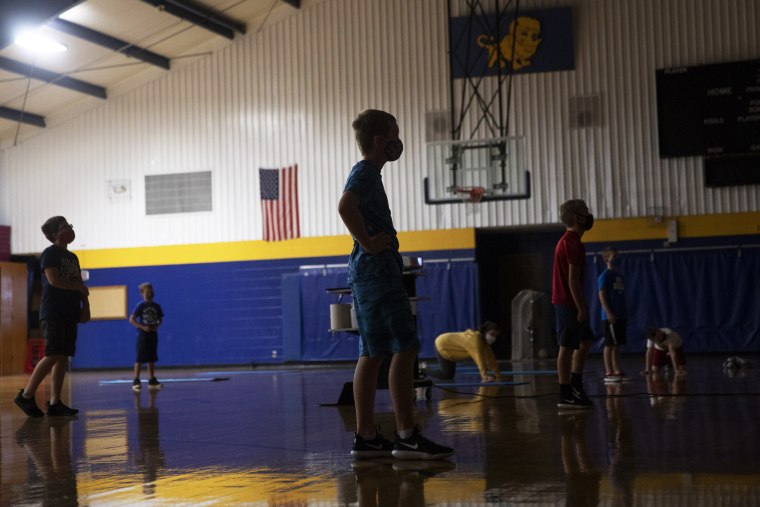Teenagers are twice as likely to be diagnosed with Covid-19 than younger kids, according to a report released Monday by the Centers for Disease Control and Prevention.
The findings could have implications for educators as they wrestle with how to reopen schools safely, as well as for public health officials charged with figuring out how to prioritize Covid-19 vaccine distribution.
Full coverage of the coronavirus outbreak
The overall number of pediatric Covid-19 cases in the United States has soared past 600,000, according to separate data from the American Academy of Pediatrics also released Monday.
The new CDC report focuses on 277,285 infections among school-age children between March 1 and mid-September.
The majority, 63 percent, were over age 12, compared with just 37 percent between the ages of 5 and 11.
It's unclear why older children may be more affected by Covid-19 than younger children. It may be that parents have more control over younger children, while teens may be more likely to mix socially, increasing the risk of spread.
The data could help to "inform decisions about in-person learning," the study authors wrote. The findings should give us reassurance" that sending kids back to school is "an appropriate maneuver based on how this pandemic has played out," said Dr. Buddy Creech, a pediatric infectious disease expert at the Vanderbilt University Medical Center in Nashville, Tennessee, who was not involved with the CDC study.
The CDC study took a deep dive into which kids under age 18 are most likely to be diagnosed with Covid-19. Cases were split almost evenly between boys and girls. But those with an underlying chronic condition — especially a lung problem, such as asthma — were more at risk.
Over half of the kids who were diagnosed with Covid-19 and had an underlying condition reported some kind of chronic lung disease.
The sicker that kids were before their Covid-19 diagnoses, the worse their outcomes appeared to be.
"Underlying conditions were more common among school-aged children with severe outcomes related to Covid-19: among school-aged children who were hospitalized, admitted to an intensive care unit, or who died, 16 percent, 27 percent and 28 percent, respectively, had at least one underlying medical condition," the study authors wrote.
What's more, the CDC study shows stark racial differences in children most affected by the coronavirus.
Black and Hispanic children were most likely to have severe Covid-19 outcomes.
"Although mortality and hospitalization in school-aged children was low, Hispanic ethnicity, Black race, and underlying conditions were more commonly reported among children who were hospitalized or admitted to an ICU," the study authors wrote.
The CDC report found that 51 school-age children have died. Overall, 109 children so far have died of Covid-19, according to the AAP. That's out of the more than 200,000 Covid-19 deaths in the U.S. since the beginning of the pandemic.
"I know the numbers are small," Dr. Richard Malley, a pediatric infectious disease specialist at the Boston Children's Hospital, said, but "those deaths could have been prevented."
Download the NBC News app for full coverage of the coronavirus outbreak
Teenagers' rate of Covid-19 disease is "nothing compared to those in our older populations," Creech said. "This is really a pandemic that has disproportionately affected the grandparents, not the grandchildren."
Indeed, the most vulnerable groups remain adults over age 65 and those with underlying medical conditions. But even though kids might have more favorable outcomes, they can clearly spread the virus to those more at risk for complications.
That, according to experts, should push teenagers close to the top of the list of those to be vaccinated if and when a safe and effective Covid-19 vaccine is made available.
"Even though the burden of disease is not felt primarily by children," Creech said, "it doesn't mean that we should not prioritize some clinical vaccine research, particularly in adolescents, so that we can begin to cocoon our grandparents and our older individuals."
Most companies that have begun phase 3 clinical trials for Covid-19 vaccines are testing adults, not children. Only Pfizer has proposed expanding vaccine studies to people as young as age 16.
"We know that if we vaccinate kids, there will be collateral benefit to those around them," Creech said.
CLARIFICATION (Sept. 29, 2020, 1:20 p.m. ET): An earlier version of this article referred imprecisely to the percentage of children with an underlying lung condition. Lung conditions were reported in more than half of children with an underlying condition, not in more than half of all children.


